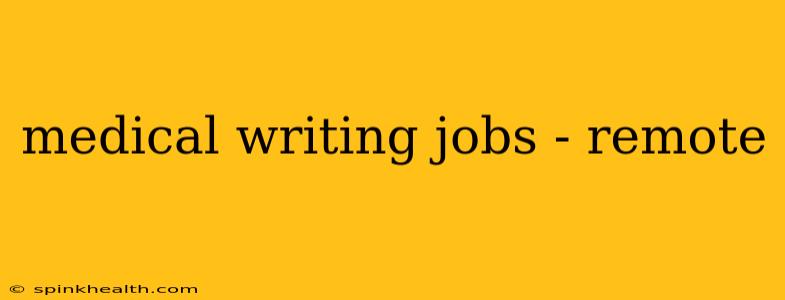The hum of the coffee machine, the gentle tap-tap-tapping of keys, the quiet satisfaction of crafting clear, concise medical information – this is the reality for many medical writers working remotely. This isn't just a trend; it's a burgeoning career path offering flexibility, autonomy, and the opportunity to make a real difference in healthcare. But navigating the world of remote medical writing jobs requires a keen eye, a strategic approach, and a deep understanding of the field. This guide will help you unlock the secrets to landing your dream remote medical writing position.
What Does a Remote Medical Writer Do?
Imagine this: you're crafting compelling narratives about complex medical treatments, transforming intricate clinical trial data into easily digestible reports, or penning patient-friendly educational materials. This is the everyday life of a medical writer. They are the storytellers of science, translating complex medical jargon into clear, accurate, and engaging content. Remote medical writers often work on:
- Regulatory documents: These include submissions to regulatory agencies like the FDA, requiring meticulous attention to detail and adherence to strict guidelines.
- Medical publications: From journal articles to presentations, medical writers help disseminate research findings to the wider scientific community.
- Medical education materials: These could be anything from patient brochures to training manuals for healthcare professionals, ensuring information is accessible and understandable.
- Website content: Medical companies and healthcare organizations rely on medical writers to create informative and engaging online content.
How to Find Remote Medical Writing Jobs?
The search for the perfect remote medical writing job begins with a strategic approach. Here's a roadmap to guide you:
1. Leverage Online Job Boards:
Websites like Indeed, LinkedIn, and Monster regularly feature remote medical writing opportunities. Don't limit yourself to searching just for "medical writer remote"; try variations like "scientific writer remote," "medical communications remote," or even "pharma writer remote" to broaden your reach.
2. Network Strategically:
Networking is crucial. Connect with professionals in the medical writing field through LinkedIn, attend virtual industry conferences, and join relevant online communities. These connections can lead to unadvertised job openings or valuable insights into the industry.
3. Explore Company Websites Directly:
Many pharmaceutical companies, medical device manufacturers, and healthcare organizations have career pages on their websites. Regularly check these sites for remote openings.
4. Freelance Platforms:
Platforms like Upwork and Freelancer.com can be great starting points, particularly for freelance opportunities. Building a strong profile and showcasing your skills is essential.
What Skills Do I Need for Remote Medical Writing Jobs?
Success in this field hinges on a blend of hard and soft skills:
- Excellent writing and editing skills: This is paramount. Clarity, conciseness, and accuracy are essential.
- Scientific literacy: A strong understanding of medical terminology, research methodologies, and clinical trials is vital.
- Attention to detail: Medical writing demands precision; errors can have serious consequences.
- Strong organizational skills: Managing multiple projects and deadlines remotely requires excellent organization.
- Communication skills: Effectively collaborating with clients and colleagues remotely requires clear and concise communication.
What are the Benefits of Remote Medical Writing Jobs?
Working remotely as a medical writer offers several significant advantages:
- Flexibility: Set your own hours and work from anywhere with a reliable internet connection.
- Autonomy: Enjoy greater control over your work and career trajectory.
- Work-life balance: Achieve a better balance between professional and personal life.
- Variety of work: Remote opportunities offer diversity in projects and clients.
What are the Challenges of Remote Medical Writing Jobs?
While remote medical writing offers numerous benefits, it's essential to acknowledge potential challenges:
- Isolation: Working independently can lead to feelings of isolation, requiring proactive efforts to build connections.
- Time management: Self-discipline and effective time management are crucial for success.
- Technology dependence: Reliable internet access and appropriate technology are essential.
How Much Do Remote Medical Writers Make?
Salaries for remote medical writers vary based on experience, location, and the type of work. Entry-level positions may earn less than experienced writers with specialized skills. However, the potential for growth and higher earning potential is significant as you gain experience and build your portfolio.
What Certifications or Education are Needed for Medical Writing Jobs?
While a degree in a science-related field is beneficial, it isn't always mandatory. However, many medical writers possess advanced degrees like a PhD or MD, which is helpful especially for advanced writing roles. Certification programs in medical writing can significantly enhance your credentials and boost your job prospects.
In conclusion, the path to a successful career as a remote medical writer is achievable with dedication, strategic planning, and a relentless pursuit of excellence. Embrace the challenges, leverage the opportunities, and prepare to embark on a rewarding journey in this dynamic and ever-evolving field.

